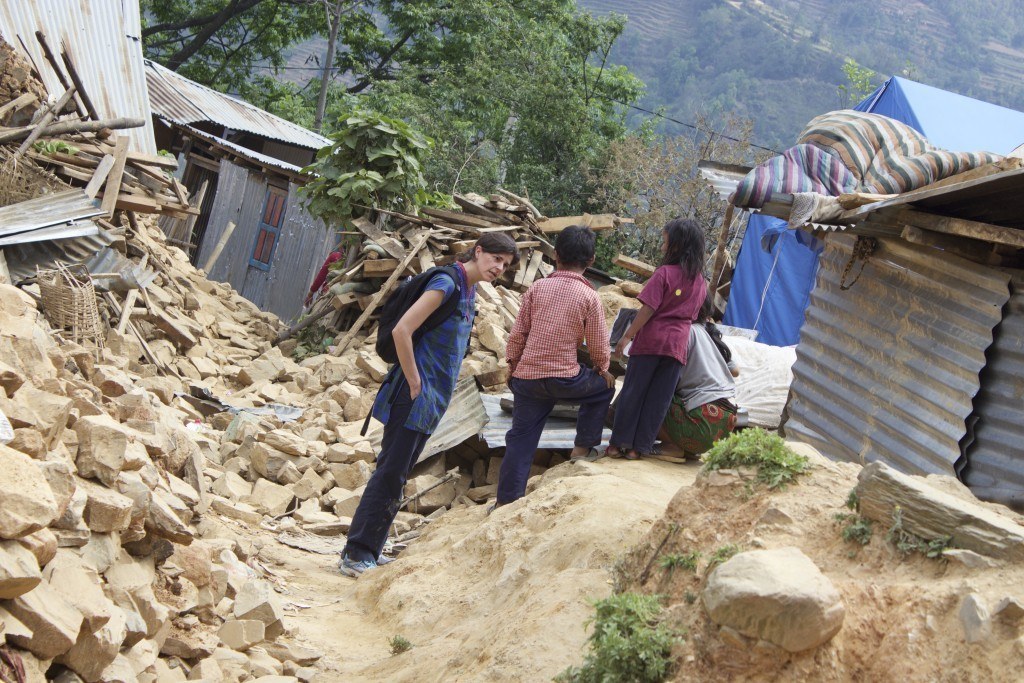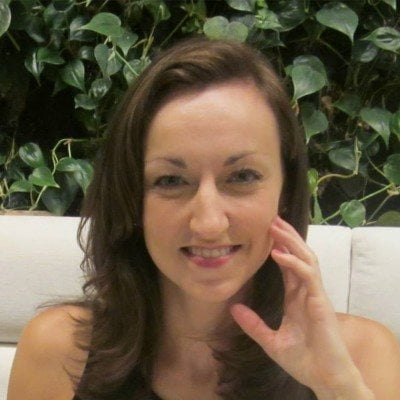As a child growing up in rural Nepal, Bishnu Pariyar would walk to school every morning with three other children from her village. During these two hour-long treks, Bishnu’s age mates treated her as an equal, chatting and giggling with her as they would any other friend. But when they stopped for a drink at a neighbor’s house along the way, everything changed: While Bishnu’s travel companions were given a cup of water to share, she was forbidden from drinking from it. Forced to beg for a sip, she would watch, humiliated, as the water was poured into her cupped hands. This prejudicial treatment was due to the fact that, despite looking and talking like her friends, Bishnu was different: She was a Dalit.
“Dalits are the lowest Hindu caste, they are at the bottom of Nepali society,” Bishnu said during a recent visit to AJWS in New York. “If a member of a higher caste touches them, the high caste person must then ‘purify’ him or herself with water. We are often called ‘untouchables.’”
Bishnu felt the sting of “untouchability” from an early age. She also witnessed its effects on her family. A farmer by profession, Bishnu’s father worked extra hours as a tailor for the high-caste people in their village—a “job” he was obligated to perform for no pay, simply because he was a Dalit. Bishnu recalls watching him sew by the light of a kerosene lamp each night before she went to bed. To her, his labor was not an act of respect for caste or religion; it was slavery.
The Birth of ADWAN
Seeing her father treated like a slave was too much for Bishnu to bear. At the age of 10, she decided to dedicate her life to ending caste discrimination and promoting equality. She began by working her way through middle school, high school and college. In 1996, while pursuing her college degree, she launched a project that would eventually lead to the founding of the Association for Dalit Women’s Advancement of Nepal (ADWAN). This grassroots group—now an AJWS grantee—empowers Dalit and other marginalized women to overcome the challenges they face. Today, ADWAN works in seven of Nepal’s 75 districts and has supported 74 women’s groups, helped send 13,000 children to school, and provided 97 adolescents with college scholarships.
“My original idea was to create small, women-run savings and loan groups that would help women gain economic independence and build solidarity between women from different castes,” she recalled. “I believed that if I could bring women from different castes together through these groups, they would stop discriminating against and start supporting one another.”
Bishnu launched her project in her home village of Gorkha, where she convinced 60 women of different castes to form three microfinance groups. With the help of two friends, she established two additional groups in a nearby village. By 1998 the project had grown, and ADWAN was born.
In the beginning, each of the five, 20-women groups received $30 in seed money, which the members could borrow to launch small businesses or support their families. The women would then pay the funds back with interest, creating a mini savings-and-loan bank that was managed by the women themselves. Over time, the bank reserves grew, and the women began supporting projects to improve their communities. They helped send girls to school and built water taps that provided clean water to the community for cooking and bathing. One group even built a new Hindu temple in which all castes and genders were welcome. The women running the groups gained stature and respect in the community, and eventually, even higher caste women wanted to be part of an ADWAN group.
Beyond Microfinance: ADWAN’s Work to Support Earthquake Recovery
As the women’s groups grew, ADWAN also grew. It expanded to new districts of Nepal and embarked on new projects to complement its microfinance work. It ran trainings in human rights, health and livelihood skills to empower women and girls; conducted drives to raise funds to help girls purchase school uniforms; and launched college scholarship programs. In 2015, it began providing disaster relief to the communities it serves when two powerful earthquakes struck Nepal, killing nearly 9,000 people and leveling half a million homes.
AJWS staff first heard about ADWAN in May 2015, when they visited Nepal in the immediate aftermath of the disasters. As we assessed the damage and sought out grassroots organizations to fund in our relief efforts, many Nepalese in the hard-hit region of Gorkha mentioned ADWAN as a trusted local organization that was helping Dalits and others on the margins of society—people who had received little or no aid from anyone else. ADWAN helped fill this aid gap in the weeks and months after the earthquakes, distributing emergency relief to 300 families and constructing 78 shelters for survivors whose homes had been destroyed during the disaster.

To coordinate this important work, ADWAN hired Tejendra Lama, who has over 20 years of experience working for development organizations, including large international groups. During a discussion with AJWS in New York, Tejendra drew upon this experience to explain why it is so important to fund grassroots groups in the aftermath of disasters: “There are so many international NGOs working on the earthquake response, and they have millions of dollars. But they are working by themselves. They are not recruiting community-based organizations like ADWAN. But groups like ADWAN are more effective: We know the issues better because we live among the people.”

AJWS made its first grant to ADWAN in December 2015 to support the building of 45 shelters for families in Fujel, a village in Gorkha. The grant will also support the construction of 250 smokeless stoves, which make the kitchen safer for women by reducing the risk of health problems caused by smoke inhalation. ADWAN has been constructing the stoves for years. Their strategy includes selecting Dalit women to serve as trainers on the proper use of the stoves—a component that has helped break down caste barriers by requiring even higher-caste women who want the stoves to accept Dalits into their kitchens.
Through its work today, ADWAN is carrying out Bishnu’s original dream of helping Nepal’s lower castes overcome the inequality that overshadowed her childhood.
“I knew early in my life that I wanted to do something for the Dalit community,” she said. “I did not want other kids to go through what I went through.”
With each Dalit girl ADWAN helps educate and inspire, and each home ADWAN builds to give a family a new beginning, the organization comes one step closer to this goal.
AJWS’s work in countries and communities changes over time, responding to the evolving needs of partner organizations and the people they serve. To learn where AJWS is supporting activists and social justice movements today, please see Where We Work.

